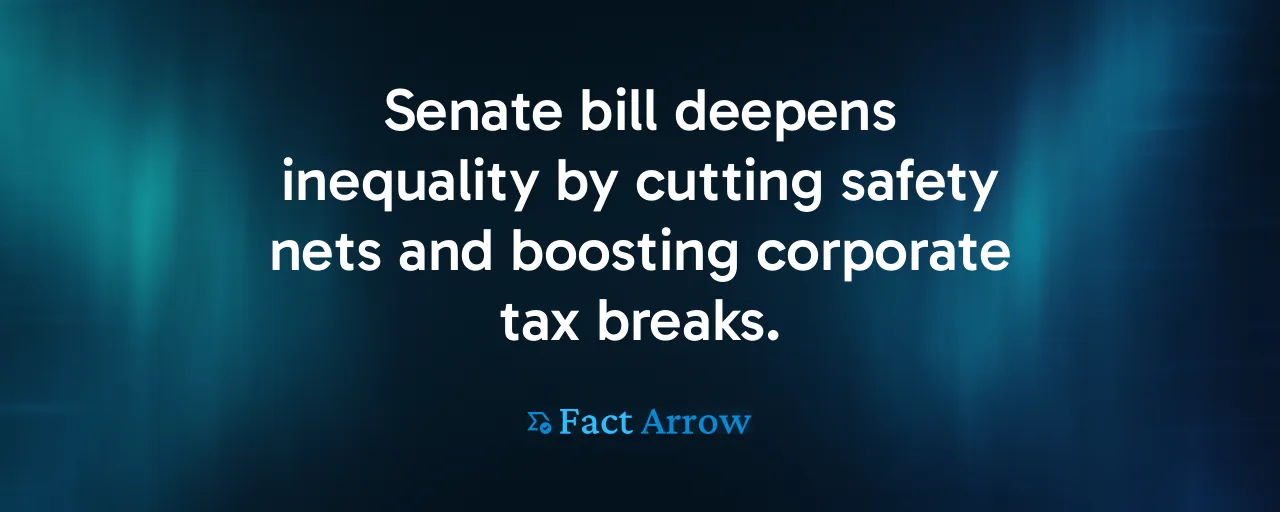A Bill That Shifts the Burden
The Senate's recent changes to the 'One Big Beautiful Bill Act' have sparked heated debate, and for good reason. House Republicans crafted a spending package meant to lock in tax cuts and shrink safety nets, but the Senate's version, passed in July, dials up the cost by nearly $1 trillion. It also tweaks the state-and-local-tax deduction cap, scales back clean-energy incentives, and boosts the debt ceiling by $5 trillion. These shifts signal a troubling trend, one that prioritizes corporate interests and wealthy households over vulnerable communities and environmental progress.
At its core, this bill reflects a choice about who bears the weight of fiscal policy. Advocates for economic justice see a clear pattern: tax breaks skewed toward the affluent, paired with cuts to programs like Medicaid and SNAP that millions rely on. The Senate's amendments, while softening some edges, fail to address the deeper inequity baked into the plan. Instead, they double down on a framework that risks widening the gap between the haves and have-nots.
The stakes are high. With the bill now in reconciliation, bypassing a Senate filibuster, its passage could lock in changes that reshape healthcare, climate policy, and economic fairness for years. For those who value equity and sustainability, the Senate's revisions are a wake-up call to scrutinize what this package truly delivers and who it leaves behind.
Medicaid and SNAP Cuts Hit Hardest
The Senate's bill keeps steep reductions to Medicaid and SNAP, programs that anchor economic stability for low-income families. Research from the Yale Budget Lab projects that these cuts could reduce income for the poorest households by 2.5 percent, a blow that compounds existing hardships. Rural hospitals, already stretched thin, face closure risks as Medicaid funding shrinks, leaving patients with fewer options for care.
These reductions have real-world consequences: families losing access to healthcare, children facing hunger, and communities fraying under economic strain. The Congressional Budget Office estimates millions could lose health coverage if the cuts take effect, a step backward from the Affordable Care Act's gains. For advocates of social justice, this is a non-negotiable line. Protecting these programs ensures dignity and opportunity for all.
Climate Goals Under Siege
Equally alarming is the bill's rollback of clean-energy incentives. The Senate version accelerates the phase-out of tax credits for wind and solar, critical drivers of renewable energy growth. The Inflation Reduction Act of 2022 expanded these credits to spur innovation and jobs, but the Senate's plan could halt $300 billion in private investment, according to energy scholars. This move undermines climate goals and threatens the livelihoods of workers in growing clean-energy sectors.
The timing couldn't be worse. With global temperatures rising and extreme weather events becoming more frequent, scaling back renewable energy support sends a discouraging signal. Communities of color, often hit hardest by pollution and climate disasters, stand to lose the most if clean-energy progress stalls. For those committed to environmental justice, preserving these incentives is a fight for both the planet and fairness.
SALT Relief Misses the Mark
The Senate's tweak to the state-and-local-tax deduction cap, making it a temporary increase until 2029, has been pitched as a compromise. But the Tax Policy Center's analysis reveals a flaw: the relief overwhelmingly benefits high-income households in high-tax states. Lower- and middle-income families, who need tax relief most, see little gain. This skewed approach fails to address the broader issue of tax fairness.
A permanent repeal of the SALT cap, paired with measures to prevent abuse by wealthy filers, would better serve working families. Instead, the Senate's plan offers a half-measure that expires just as families might start to feel its benefits. For those who champion progressive tax policy, this is a missed opportunity to level the playing field and support communities grappling with rising costs.
Debt Ceiling Hike With Strings
Raising the debt ceiling by $5 trillion avoids a catastrophic default, a pragmatic step that financial markets welcome. But bundling it with cuts to safety nets and clean energy creates a bitter trade-off. The Senate's plan adds $1 trillion more to the deficit than the House version, a move that could spike interest payments by $70 billion over a decade, per budget experts. This borrowing, while necessary, comes at the expense of programs that protect the vulnerable.
Historically, debt ceiling hikes have been cleaner, often paired with balanced offsets. The current approach, tied to a reconciliation package that excludes Democratic input, limits debate and risks long-term fiscal strain. Advocates for responsible governance argue for decoupling the debt ceiling from partisan priorities, ensuring stability without sacrificing social progress.
A Path Rooted in Fairness
The Senate's bill, as it stands, falls short of the values that prioritize people over profit. Stripping Medicaid and SNAP cuts would protect millions from hardship. Preserving clean-energy credits would safeguard jobs and the planet. A fairer SALT policy, focused on working families, could ease economic pressures without rewarding the ultra-wealthy. These changes align with a vision of governance that lifts all citizens.
Lawmakers face a choice: pass a bill that deepens inequality or pivot toward policies that strengthen communities. The reconciliation process, while complex, offers a chance to rebalance priorities. Constituents, from rural healthcare providers to clean-energy workers, are watching closely, demanding action that reflects their needs and aspirations.
This moment calls for courage. By rejecting austerity for the vulnerable and reinvesting in climate and equity, Congress can chart a course that honors the public good. The fight for a fairer, greener future isn't over, and every voice raised in its defense brings that goal closer.
